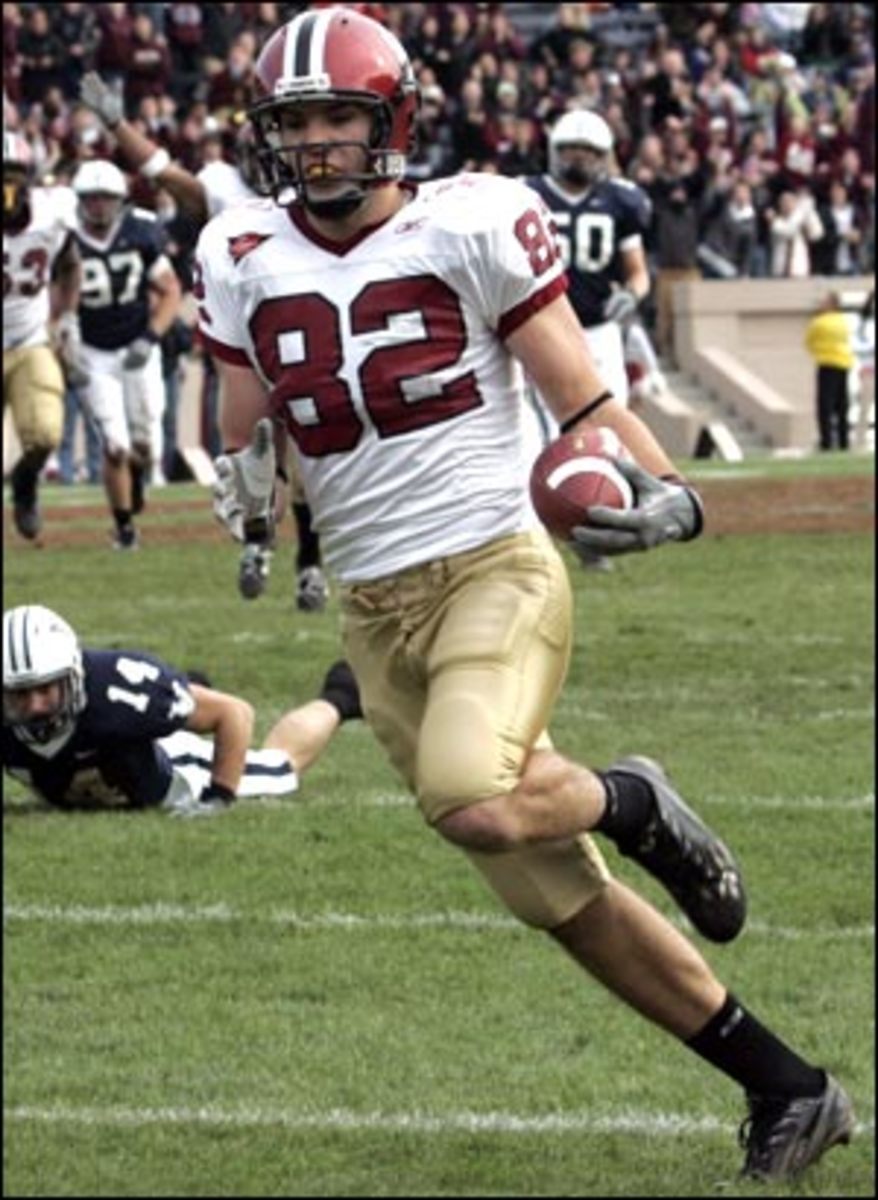No playoffs for you!
In 1968, when Harvard and Yale had previously faced off as Ivy League unbeatens, things stayed that way.
The Crimson miraculously scored 16 points in The Game's final 42 seconds to tie the Bulldogs -- who then featured star tailback Calvin Hill -- and the Harvard Crimson cleverly declared, "Harvard Beats Yale, 29-29."
In 2007, however, no word play was necessary. President George W. Bush (Class of '68) predicted victory for his "mighty Bulldogs," but the 124th edition of college football's oldest rivalry saw Harvard overwhelm Yale, 37-6. Fans had formulated an exit strategy by halftime.
The 57,248 assembled in New Haven, Conn. watched Crimson quarterback Chris Pizzotti dissect Div. I-AA's top-ranked passing and scoring defense by throwing for 316 yards and four touchdowns. His 6-foot-5 receiver, Matt Luft, notched 123 yards and two scores in the first quarter; the Yale offense, conversely, received zero red-zone chances the entire game and went 1-18 on third and fourth downs.
"We dreamed we'd get this result, we didn't dream we'd get this kind of dominance," Crimson head coach Tim Murphy said.
But the dream, as always, ended there.
Why? The answer, sadly, is all too elementary in the Ivy League. The end of November marks the start of one of college football's hidden jewels: the NCAA Football Championship Subdivision's 16-team, single-elimination playoff tournament, won two years in a row by noted giant-killer Appalachian State (lately, there have even been talks to expand the field to 24). The Ivy League champion, however, cannot participate.
While unblemished Harvard was crowned the winner of the Ancient Eight -- rising from No. 25 to No. 22 in the national rankings -- the conference continues to refuse an automatic bid.
Ever since its formation, the Ivy League has maintained strict rules barring its football teams, and only its football teams, from competing in their sport's post-season tournament. While their Patriot League foes now chase a national title, Harvard-Yale, always the last game of the season, serves as the two schools' de facto playoff. (With no game as massive as The Game, the other six Ivy institutions are even less fortunate.)
In years like this one, then, the impossibility of that ultimate prize becomes even more frustrating. "To see teams we consistently beat go on to the playoffs while we do nothing the month of December doesn't make sense to me," says Harvard wideout Corey Mazza. The senior argues that his teammates have never heard an "adequate reason" why every other one of Harvard's 41 sports -- the most in the nation -- is allowed to play for a true championship, but they are not.
"My career now over, I am never going to know if we could have ever marched through the playoffs and brought home a national title showing the nation that yes, Harvard indeed has a football team, and no, we are not a bunch of collar-popping prepsters," Mazza says.
His thesis is by no means ground-breaking. In 2004, fans groused when then-No. 13 Harvard was the only undefeated team in I-AA, going 10-0 behind star quarterback Ryan Fitzpatrick (now of the Cincinnati Bengals) and star running back Clifton Dawson (now of the Indianapolis Colts).
In fact, despite students' obvious relative apathy towards their own teams -- there is pride and history in the Ivy League, to be sure, but there are also empty seats -- columnists and student councils alike have all argued in favor of lifting the ban before. And convincingly, at that.
Consider Princeton president Shirley Tilghman's response to the undergraduate student government's effort in 2006, patterned on Harvard's eventually futile attempt to repeal the restriction. Discarding the notion that the Ivy presidents' resistance could be based on an exams schedule conflict, she cited "the very special rivalry that has been our tradition of Ivy football," saying that "if the focus of competition became post-season play, we would inevitably lose some of that great tradition."
Also of imminent concern to Tilghman: curbing the "escalation in intensity (and player size) that has swept the rest of the country."
One has to wonder, exactly, what epidemic of gigantism Tilghman and her presidential peers fear. As well as what, exactly, any bastion of amateurism has to fear from "intensity" itself, let alone the decidedly humble I-AA playoffs.
In reality, athletic recruiting in the Ancient Eight is uniquely governed by the stringent rules of the Academic Index, a league-wide admissions metric rooted in standardized test scores and class rank. None of this would change if playoffs were allowed. Further, it seems similarly irrational to believe that coaches are somehow currently keeping their foot off the recruiting pedal today.
What these archaic regulations instead withhold from Ivy football is a basic consideration that everyone else -- including the putative actual giants in basketball -- already enjoys.
"It can be frustrating at times as a competitor," Pizzotti says. He loves the Harvard-Yale atmosphere, but admits that, "You always want to see where you stand with the best. You wonder how much you could accomplish if given the chance."
As in 1968, what only appeared to be a playoff victory will have to suffice.






